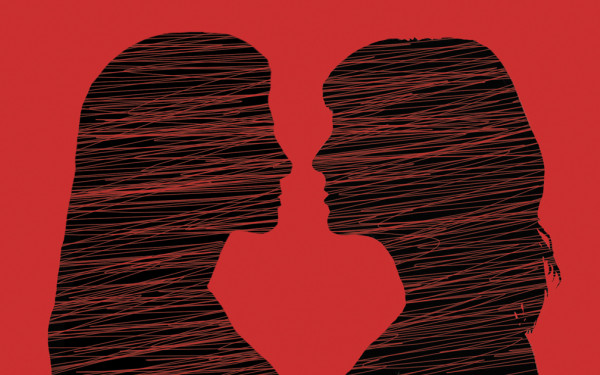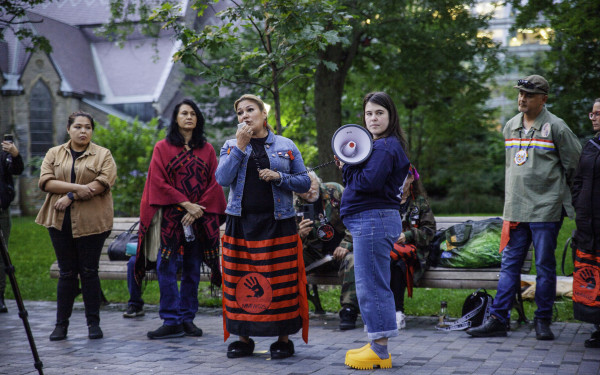Caribou Legs Runs for the Missing
Gwich’in Man Journeys Across Canada for Missing and Murdered Indigenous Women
For 20 years Brad Firth, better known as Caribou Legs, lived on the streets of Vancouver.
“I was doing drugs, drinking, doing crime,” he said.
He’s come a long way since then—both literally and figuratively.
Caribou Legs has spent the last few months running across Canada to honour and raise awareness about Missing and Murdered Indigenous Women. Having begun in Vancouver in May, he stopped in Montreal on Friday, Sept. 9 for a conference at Concordia.
“Only two out of every ten people I speak to know what MMIW stands for,” he said at the conference. “It’s a very apathetic country. How do we get people to care? I want people to fucking care.”
MMIW is a Canada-wide phenomenon, with the Native Women’s Association of Canada estimating that over 4,000 aboriginal women have been murdered or gone missing since 1980. To put that in perspective, Canada’s indigenous population is just over 1.4 million people—slightly larger than the population of the Ottawa-Gatineau region, according to the 2011 federal census.
In Quebec in particular, knowledge is lacking about MMIW. Chantel Henderson—representing Missing Justice, a grassroots Montreal collective active on the issue since 2008—said this results from a process of invisiblization which begins with an absence of indigenous history in Quebec schools.
“Because of that, it’s almost like indigenous people in Quebec are nonexistent, or are artifacts,” she says. “It’s the same situation with the police.” She continued, “If society sees certain people as less valuable, the police don’t find any value in bringing [perpetrators of violence against indigenous women] to justice.”
“We need to re-educate the police, and we need to get our hands in their training,” Caribou Legs said at the conference.
A member of Gwich’in First Nation, Caribou Legs used his running to escape his life in the streets. Today, he laughed, explaining that he first ran “to get away from the cops.”
“One day, one of [the police officers] pointed out to me that I should go run with a running group. So I checked it out,” he recalled. “The next step was for me to start using my running for a cause.”
Caribou Legs runs with war paint on his face, and wears full indigenous regalia. He carries a drum that he refers to as his suitcase. When an audience member asked how he plans his route in the morning, he laughed and said that he would “ask Grandmother Google.”
Public Inquiry
Since his election in autumn 2015, Justin Trudeau has begun the process of a public inquiry into MMIW—a long-sought demand by groups such as Missing Justice for many years.
Caribou Legs said the inquiry is “about 150 years too late,” but that he still appreciates Trudeau “taking a stand.”
“I think it’s a good start, but eradicating racism against different groups across Canada is where it needs to go,” he said.
Henderson shared his sentiment, saying that she sees “a lot of potential for the inquiry.”
Melissa Mollen Dupuis, a spokesperson for Idle No More Quebec, a grassroots indigenous protest movement, said during the conference, “We must make sure that this inquiry recognizes and validates native women.”
The inquiry may also serve as a platform for indigenous people to speak of the broader social issues that have led to widespread violence against indigenous women.
“There’s poverty, there’s homelessness, there’s lesser wages—especially for women,” Henderson said. “There are all these factors that can affect our future, our housing situation, employment.”
Henderson also tied violence against indigenous women to the ongoing colonial policies of the Canadian government.
“Colonialism continues today because a high proportion of Missing and Murdered Indigenous Women are tied to the dispossession of land,” Henderson explained. “Half of our people live in urban centres, and that’s where the majority of our women go missing.”
She continued, “The women who are left on reserves are subjected to abuse, drugs, alcohol, poverty.”
As large corporations continue to appropriate land, more indigenous women are continuously put in peril.
“The dispossession of our land takes us away from our culture, our traditions, our people and our livelihoods,” she said. “Land is being claimed by corporations for extraction of resources.”
One high-profile example of this dispossession is occurring in Northern Alberta, where the expanding Tar Sands have displaced various indigenous nations–notably the Athabasca Chipewyan and Beaver Lake Cree First Nations, among others–of their traditional territory.
All participants seemed to hope that the inquiry was the beginning of something bigger. Caribou Legs highlighted this point.
“Systemic racism has been here for 500 years, so it’s going to take time to change,” said Caribou Legs.
“If I have to run across Canada five more times, that’s what I’m going to do.”

2web_900_585_90.jpg)



_(1)_600_375_90_s_c1.jpg)
1_600_375_90_s_c1.jpg)
